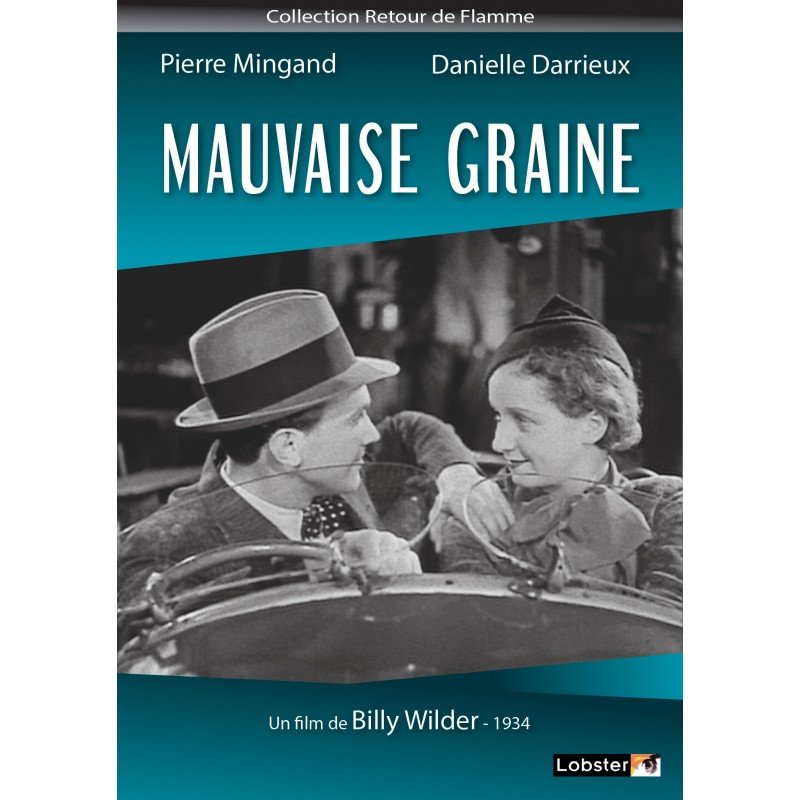Introduction:
“Mauvaise Graine,” released in 1934, stands as a gem in the annals of French cinema, marking the directorial debut of the legendary filmmaker Billy Wilder. Co-directed by Alexander Esway and co-written by Wilder himself, this early work showcases the budding talent and visionary storytelling that would later cement Wilder’s status as one of the greatest directors in Hollywood history. In this extensive exploration, we delve into the intricacies of “Mauvaise Graine,” unraveling its narrative tapestry, analyzing its thematic depth, and celebrating its enduring legacy in the realm of romantic drama.
Setting the Stage:
Set against the backdrop of 1930s Paris, “Mauvaise Graine” follows the tumultuous romance between Henri Pasquier, a wealthy young man with a penchant for fast cars, and Jeannette, a vivacious streetwise woman from the wrong side of the tracks. As their worlds collide and passions ignite, Henri and Jeannette find themselves entangled in a whirlwind of love, betrayal, and redemption. Against a backdrop of jazz clubs, racing circuits, and bustling boulevards, their love story unfolds with all the passion and intensity of a classic romantic drama.
Exploring Character Dynamics:
At the heart of “Mauvaise Graine” are its richly drawn characters, brought to life by a talented ensemble cast. Henri Pasquier, played with suave charm by Pierre Mingand, epitomizes the carefree spirit of the Roaring Twenties, with his love of fast cars and reckless abandon. Opposite him is Jeannette, portrayed with fiery intensity by Danielle Darrieux, whose streetwise wit and fierce independence captivate Henri’s heart. Supporting performances by Bernard Lancret as Marcel, Henri’s loyal friend, and Saturnin Fabre as Jeannette’s estranged father, add depth and nuance to the film’s ensemble cast.
Navigating Themes:
“Beneath its romantic facade, “Mauvaise Graine” grapples with themes of class disparity, societal expectations, and the transformative power of love. Henri and Jeannette’s romance defies societal norms and challenges the rigid social hierarchy of 1930s Paris, highlighting the universal themes of love’s ability to transcend barriers and unite souls across divides. As their relationship blossoms amidst adversity, the film explores the complexities of identity, ambition, and the pursuit of happiness in a rapidly changing world.
Celebrating Cinematic Craftsmanship:
Despite being Wilder’s directorial debut, “Mauvaise Graine” exhibits the masterful craftsmanship and keen visual storytelling that would define his illustrious career. From its striking cinematography to its evocative set design and atmospheric lighting, every frame of the film is infused with a sense of time and place that transports viewers to 1930s Paris. Wilder’s skillful direction, coupled with the film’s sharp screenplay and memorable score, creates a cinematic experience that is both immersive and emotionally resonant.
Legacy and Influence:
While “Mauvaise Graine” may not enjoy the same widespread recognition as Wilder’s later works, its impact on French cinema and the director’s own career cannot be overstated. The film’s blend of romance, drama, and social commentary foreshadows the thematic richness and narrative complexity that would define Wilder’s later masterpieces. Despite its modest beginnings, “Mauvaise Graine” remains a testament to Wilder’s talent and vision as a filmmaker, foreshadowing the cinematic brilliance that would unfold in the decades to come.
Conclusion:
“Mauvaise Graine” stands as a testament to the enduring power of love and the transformative nature of cinema to capture the human experience. With its captivating romance, memorable characters, and timeless themes, this early work from Billy Wilder continues to captivate audiences with its charm and sophistication. As we revisit the streets of 1930s Paris and witness the tumultuous romance of Henri and Jeannette, we are reminded of the enduring allure of classic cinema to transport us to worlds of passion, intrigue, and unrelenting emotion. In the pantheon of cinematic treasures, “Mauvaise Graine” shines as a hidden gem waiting to be discovered and cherished by generations of film enthusiasts.
